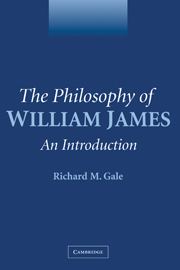Book contents
- Frontmatter
- Contents
- Preface
- Introduction
- PART I THE PROMETHEAN PRAGMATIST
- 1 The Ethics of Prometheanism
- 2 The Willfulness of Belief
- 3 The Freedom of Belief
- 4 The Will to Believe
- 5 The Ethics of Truth
- 6 The Semantics of “Truth”
- 7 Ontological Relativism: William James Meets Poo-bah
- PART II THE PASSIVE MYSTIC
- Bibliography of Works Cited
- Suggested Further Readings
- Index
2 - The Willfulness of Belief
Published online by Cambridge University Press: 06 January 2010
- Frontmatter
- Contents
- Preface
- Introduction
- PART I THE PROMETHEAN PRAGMATIST
- 1 The Ethics of Prometheanism
- 2 The Willfulness of Belief
- 3 The Freedom of Belief
- 4 The Will to Believe
- 5 The Ethics of Truth
- 6 The Semantics of “Truth”
- 7 Ontological Relativism: William James Meets Poo-bah
- PART II THE PASSIVE MYSTIC
- Bibliography of Works Cited
- Suggested Further Readings
- Index
Summary
The previous chapter dealt with premise 1 of James's Master Syllogism.
We are always morally obligated to act so as to maximize desire–satisfaction over desire–dissatisfaction.
Belief is an action.
Therefore, we are always morally obligated to believe in a manner that maximizes desire–satisfaction over desire dissatisfaction.
Premise 2 is the concern of this chapter. For the argument to work, however, premise 2 must be beefed up to assert that
2′ Belief is a free action,
the reason being that 3 morally obligates us to believe in a certain manner but we can have a moral obligation to act in a certain way only if we are free to do so. This chapter concentrates only on whether belief is an action for James, leaving its freedom for Chapter 3 and our justification for believing in its freedom to Chapter 4.
James's overall argument for belief being an action is based on his identification of belief with the will, and the will, at least in one of its senses, with effortful attention to an idea. Because effortful attention is something that we can do intentionally or voluntarily, it follows by Leibniz's law of the indiscernibility of identicals that belief also is an intentional action, and thereby, provided it is free, subject to the casuistic rule:
We are always morally obligated to act so as to maximize desire–satisfaction over desire–dissatisfaction.
It is via our acts of effortful attention that we are able to play the promethean role of co-creators of actuality, truth, value, meaning, and personal identity, as well as the course taken by future history.
- Type
- Chapter
- Information
- The Philosophy of William JamesAn Introduction, pp. 38 - 56Publisher: Cambridge University PressPrint publication year: 2004

